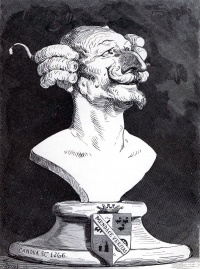Honesty
From The Art and Popular Culture Encyclopedia
| Revision as of 21:22, 12 November 2007 Jahsonic (Talk | contribs) (&) ← Previous diff |
Current revision Jahsonic (Talk | contribs) |
||
| Line 1: | Line 1: | ||
| + | [[Image:Doré's caricature of Münchhausen.jpg|200px|thumb|left| | ||
| + | [[Doré's caricature of Münchhausen]], a portrait bust of Baron Münchhausen, a typical unreliable narrator]] | ||
| + | {| class="toccolours" style="float: left; margin-left: 1em; margin-right: 2em; font-size: 85%; background:#c6dbf7; color:black; width:30em; max-width: 40%;" cellspacing="5" | ||
| + | | style="text-align: left;" | | ||
| + | "[[Scratch an 'altruist', and watch a 'hypocrite' bleed]]" --[[Michael Ghiselin]], on [[human nature]]. | ||
| + | <hr> | ||
| + | "[[Weak people cannot be sincere]]" --François de La Rochefoucauld | ||
| + | <hr> | ||
| + | "Only animals who are below civilization and the angels who are beyond it can be [[sincerity|sincere]]. [[Human|Human being]]s are, necessarily, [[actor]]s who cannot become something before they have first [[Role-playing|pretended]] to be it; and they can be divided, not into the [[Hypocrisy|hypocritical]] and the sincere, but into the sane who know they are acting and the [[Madness|mad]] do not." --''[[The Age of Anxiety]]'' (1947) by W. H. Auden | ||
| + | <hr> | ||
| + | "Telle est la [[loi naturelle]]; quiconque en est rigide observateur, est [[honnête homme]], et mérite la confiance de tout le genre humain. Quiconque ne la suit pas scrupuleusement, a beau affecter les spécieux dehors d'une autre religion, est un fourbe, ou un [[hypocrite]] dont je me défie."--''[[Man a Machine]]'' (1748) by Julien Offray de La Mettrie | ||
| + | |} | ||
| + | |||
| {{Template}} | {{Template}} | ||
| - | '''Honesty''' is the [[human quality]] of communicating and acting [[truth]]fully related to [[truth]] as a value. This includes listening, and any action in the human repertoire — as well as speaking. | ||
| - | Superficially, honesty means simply,stating facts and views as best one truly believes them to be. It includes both honesty to others, and to oneself (see: [[self-deception]]) and about ones own motives and inner reality. Dishonesty, at times, has the ability to cause misfortune to the person who lied. | + | '''Honesty''' or '''truthfulness''' is a [[facet]] of [[moral character]] that connotes positive and [[virtue|virtuous]] attributes such as [[integrity]], [[truth]]fulness, straightforwardness (including straightforwardness of conduct: [[Good faith|earnestness]]), along with the absence of lying, cheating, theft, etc. Honesty also involves being trustworthy, [[Loyalty|loyal]], [[wikt:fair#Adjective|fair]], and [[Sincerity|sincere]]. |
| + | |||
| + | A reputation for honesty is denoted by terms like [[Reputation|reputability]] and [[trustworthiness]]. Honesty about ones future conduct, loyalties, or commitments is called [[accountability]], reliability, [[dependability]], or [[conscientiousness]]. | ||
| + | |||
| + | Someone who goes out of their way to tell possibly unwelcome truths extends honesty into the region of [[candor]] or [[frankness]]. The [[Cynicism (philosophy)|Cynics]] engaged in a challenging sort of frankness like this called [[Parrhesia|''parrhêsia'']]. | ||
| + | |||
| + | ==See also== | ||
| + | *[[Authenticity (philosophy)]] | ||
| + | *[[Good faith]] | ||
| + | *[[Integrity]] | ||
| + | *[[Lie]] | ||
| + | *[[Honest Man]] | ||
| + | *[[Morality]] | ||
| + | *[[Parrhesia]] | ||
| + | *[[Sincerity]] | ||
| + | *[[Spin (propaganda)]] | ||
| + | *[[Trust (emotion)|Trust]] | ||
| + | *[[Truth]] | ||
| + | *[[Diogenes Looking for an Honest Man]] | ||
| {{GFDL}} | {{GFDL}} | ||
Current revision

|
"Scratch an 'altruist', and watch a 'hypocrite' bleed" --Michael Ghiselin, on human nature. "Weak people cannot be sincere" --François de La Rochefoucauld "Only animals who are below civilization and the angels who are beyond it can be sincere. Human beings are, necessarily, actors who cannot become something before they have first pretended to be it; and they can be divided, not into the hypocritical and the sincere, but into the sane who know they are acting and the mad do not." --The Age of Anxiety (1947) by W. H. Auden "Telle est la loi naturelle; quiconque en est rigide observateur, est honnête homme, et mérite la confiance de tout le genre humain. Quiconque ne la suit pas scrupuleusement, a beau affecter les spécieux dehors d'une autre religion, est un fourbe, ou un hypocrite dont je me défie."--Man a Machine (1748) by Julien Offray de La Mettrie |
|
Related e |
|
Featured: |
Honesty or truthfulness is a facet of moral character that connotes positive and virtuous attributes such as integrity, truthfulness, straightforwardness (including straightforwardness of conduct: earnestness), along with the absence of lying, cheating, theft, etc. Honesty also involves being trustworthy, loyal, fair, and sincere.
A reputation for honesty is denoted by terms like reputability and trustworthiness. Honesty about ones future conduct, loyalties, or commitments is called accountability, reliability, dependability, or conscientiousness.
Someone who goes out of their way to tell possibly unwelcome truths extends honesty into the region of candor or frankness. The Cynics engaged in a challenging sort of frankness like this called parrhêsia.
See also
- Authenticity (philosophy)
- Good faith
- Integrity
- Lie
- Honest Man
- Morality
- Parrhesia
- Sincerity
- Spin (propaganda)
- Trust
- Truth
- Diogenes Looking for an Honest Man

